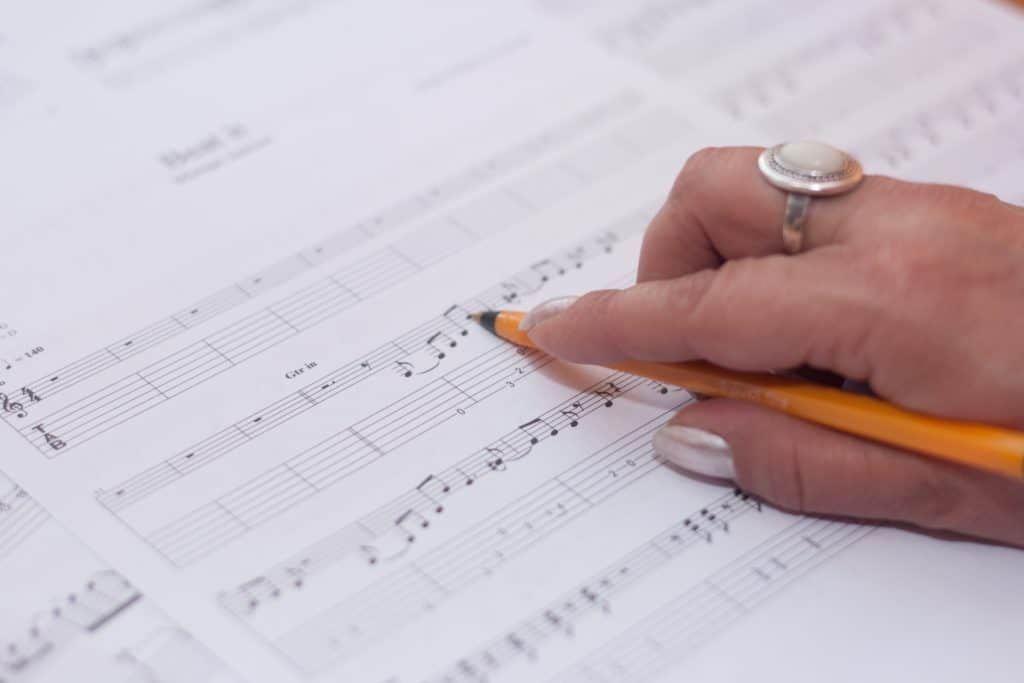In today’s post, we’ll talk about how to develop your composition skills and get better at writing music.
The process of composing an interesting chord / bass progression and its rhythm is nowadays one of the main differentiations we have from track to track. Since the arrangements are normally really similar, having a killer composition is what can set you apart from other artists.
But who am I to say anything about composition? I want you to listen to my track ‘Find My Own’, supported by Above & Beyond, Dash Berlin, Andrew Rayel, and many other, as an example of where I’ve applied the techniques that I’ll show you today and judge it by yourself:
Good enough? So, here are what we’re going to talk about today:
- Developing Your Musical Taste
- The Real Importance of Music Theory to Composition
- Practice Makes Perfect
- Immerse Yourself in the Music
- Either “Hell Yeah” or Move to the Next
- Piano, Bass and Kick… Only.
- Make an Idea Library
- Give Feedback to Someone
- Watch Out for Your Mood

Developing Your Musical Taste
Have you ever heard that old clichê “garbage in, garbage out”? It’s not a clichê for no reason, and the idea is that if you consume garbage art, you’ll have a higher chance to create garbage as well. But honestly, I think consuming garbage is important.
I was once seen as less interesting to some people when I said that I was as eclectic as the word could be, but I still proudly say it. I listen to everything. From Brian Eno to Katy Perry, from Kaizers Orchestra, a Polka band who sings in Norwegian, to Il Volo, an Italian operatic pop trio, and I don’t know what they are saying when they sing. In my point of view, this is what generates all my capabilities, modesty aside, when it comes to composing music since it’s what influenced me.
A friend of mine who was a screenwriter in a huge TV show in Brazil once said to me “I watch at least one movie per day and I read around 3 books per week because I want to consume a lot of info to be able to create something magnificent when I start writing. Movies and books are not a fun time to me, and even if they are, they are influencing the way I create”
By consuming it all, you’ll be exposed to different instruments, voices, tones, rhythms, melodies, arrangements. All of that will be later put to use when you create. Therefore, consuming garbage is important for you to know what is garbage, but it is mainly important to consume quality material so you can later output it as well.
The Real Importance of Music Theory to Composition
If there is one thing that I consider really important when learning an instrument is the variety of genres it exposes you to.
I’ve written about this once in a previous post, but I’ll say it again. Music theory is not the decisive ingredient between a good and a bad artist. There are several artists who are amazing in their craft who didn’t know a thing about music theory and played “by ear”. Michael Jackson was one of them, Deadmau5 is one of them. Although MJ could play instruments a bit, he couldn’t read or write music at all. Listen to how he shows his crew his idea for Beat it.
The importance of music theory comes from all the exposure you get to different genres. Although I barely touch my bass guitar nowadays, back when I was 12 I started learning bass to play punk rock and ended up studying blues, Bossa nova and a Brazilian carnival genre called “Axé”, the latest being what rock lovers abhorred. All these different genres expose you to different scales, rhythms, sounds and ways to go with your music that no other experience can give you.
Therefore, as mentioned before, music theory is not important because of the theory. You can learn all the theories you want, you can learn as many instruments as you want, and this won’t necessarily improve your composition skills. Studying music theory is important because you unravel different genres that you wouldn’t if it wasn’t for the difficulty of playing it.
Even though, you want to learn music theory, I recommend you check out Dave’s Conservatoire. It’s a free web training on Music Theory and it’s really good (I’ve done it!).
Practice Makes Perfect
As composition itself is a skill, we must treat it as one like your ability to play guitar. It’s not because you know the notes of YYZ from Rush that you’ll know how to play it. Therefore, it’s not because you know the chord options that you’ll use them effectively. Therefore, there are couple things you can practice then:

- Listening to different music: As said, listening to music outside of your comfort zone alone can expand your horizons and give room to new possibilities when it comes to composition;
- Analyze music by others: Try to understand a new genre and its melody. How it is timed, how it keeps your attention, how it surprises you, how a chord progression starts and how it ends. This will help you develop your skills to analyze if your melody fits in the genre you want to create. In addition, pay attention to timing, “keeping attention” and “surprises” are essential to all art forms and not only music;
- Ask for feedback: If you like something, but 4 people that you asked think it’s weird, investigate why. You don’t necessarily need to change it, but try to understand what others think about your composition and why it is weird. My rule is that if more than 30% of the people say something is wrong, then something needs to be changed. This is actually one of the mistakes I used to make and I think you should avoid, as said in this post;
- Practice: If you know how to play an instrument, pick it up and practice playing a song you like. Sometimes a whole song can come from a mistake you made while trying to play something else;
- Write the same melody for different purposes: What if you had to write one melody to your country’s anthem? Now, try to rewrite the same composition for your local supermarket. Now, to an elevator. This will not only help you get a perspective of different elements you need for each purpose, but it will develop the sense of purposeful writing;
- Decide what not to write: Limiting your options can help you get a deeper look into what you want to write and get what you don’t want to write out of the way.
Immerse Yourself in the Music
Whenever I want to write something emotional, I immerse myself in emotional tracks. I want to get as emotional as I can possibly be before I create something, so I listen to tracks that make me emotional. For example, if I want to get emotional, I normally listen to piano and strings songs like Wicked Game‘s cover by Gemma Hayes or Waking Up Slow by Gabrielle Aplin.
This process of immersion is something I do every time I’m creating something challenging, and I find it crucial because it adapts my ears to something I find emotional. I’m always listening and analyzing the tracks, but the most important of this process is getting in the same vibe of the tracks.
To illustrate the process, from these two songs, vocals play a major role, so I might compose something for a vocal. Soft voices that can rise are the ones to go after. Piano notes are calm and chilled, nothing so bouncy. Strings in the chorus could help the emotion. Well, I’ve already outlined what I need to do in my next break.

Whenever choreographer Twyla Tharp is starting a new project, she puts all her references into a box. The box represents her connection to the project, but also represents a place where she can immerse herself with clippings, artwork, videotapes of her current project. This is what this immersion is all about.
Either “Hell Yeah” or Move to the Next
Just after writing your composition, listen to it. If your opinion is not “Hell yeah”, move to the next one. The composition that you’re working on should excite you and you should not put time into something that you don’t feel 100% excited about. Therefore, when it comes to melodies, it needs to hook you from the beginning and these happen naturally… you don’t need to force them.
I apply this to everything in my life, and especially when writing or listening to something for a collab. It should click with you from the beginning, and if it doesn’t maybe that’s not the one for you.
For example, I remember when I first listened to Don’t You Worry Child by Swedish House Mafia and hated it. Days after, I loved it. The same could happen to your ideas. If you don’t like them, save them and go back to them a week later. If you still don’t like it, trash it, but give it the benefit of doubt at first and save it for later.
Piano, Bass and Kick… ONLY.
To make your screening process more bulletproof, choose one bass layer, one piano and one kick to write your composition and your composition should be outstanding with only this.
When I’m composing a track, I write the chord progression with a piano and bass progression with one layer of bass and later match it with a kick & sidechain to simulate the effect that I want. If it’s not a “hell yeah”, next…
Doing it this way, you’re stripping your composition to the most basic elements and then you’re truly analyzing the composition with none of sound design that you might like. If the composition is good, it will be even better when you add other elements and enhance the sound designing, so go for it.
MIDIs Are Your Friend
MIDI files are your friend and they won’t bite you… You don’t need to use the actual untouched midi for your final composition piece, but change it enough to make it unique.
For example, found a MIDI piece in a house sample pack that works for trance? Ok, tweak it a bit, change the notes a bit, change the scale, put your touch in it so that MIDI is yours.
I’ve heard that Billie Jean by Michael Jackson was inspired by Riders on the Storm by The Doors and, when analyzing it, I can see that happening. However, it’s in a different context, different vibe, so it’s fine to me even if I discovered MJ used Riders on the Storms midis to create it.
Remember the post about creativity I posted a couple weeks ago? When you copy an idea, you’re plagiarizing, when you adapt it enough to a new vibe so your influences are unrecognizable, you’re being creative, but the root is the same idea.

Make an Idea Library
Last week, I was busy with some mix and masterings that I needed to do, but I wanted to create something to keep my creative habit, even though I’d not use it in the next few days.
The reason I did this is to create an idea inventory. This is a place I go when I want to create something, but I’m not feeling creative. In addition, it’s a place where I know I’ll find ideas if I need to start a track on the spot.
Especially when you’re not feeling creative, this idea inventory will be an excellent place for you to search for things that might become tracks, since the creative part of the composition is already done.
Give Feedback to Someone
You must think how the hell is this going to help me? Remember when we talked about analyzing tracks in the last post, the more thorough the feedback, the better the analysis of the track should be.
Does this break fit with this kind of drop? What feels weird in this chord progression and why? Why note is he playing there? Since you have no attachment to the track you’re listening to, you’ll be able to give your honest opinion of how the song sounds and makes you feel. This will help you better understand what to do and what to avoid with your tracks.
Therefore, by listening to other work in progress tracks, you’ll not only learn about what works and what doesn’t, but also you’ll listen to more tracks that will spark your creativity.
Watch Out for Your Mood
If there’s one thing that I don’t like to force it is creating melodies when I’m angry or pissed off, even if I have to. In that vibe, I’m better off going to sleep and creating something new in the morning.

Your mood alters not only your ability to create, but your perception of what you create and listen. Therefore, if you’re moody, you’ll be a lot more judgemental and may be passing away an idea that you may have liked in the first place, but your mood got in the way.
Wanna do a test, listen to a song you don’t like when you’re moody. You’ll discover that you hate it even more on that day and will find many mistakes you haven’t noticed before. If you’re angry, just go to bed.
A bit more practical than the last post, now it’s time for you to sit and try these methods to be creative. I would love to know more about your techniques to compose new tracks, so, if you have any other tips, please let me know!
Now it’s your turn
These are my three top tips for you on composition and I hope you’ve enjoyed them.
Now I’d like to hear what you have to say:
What was the most uncommon way you’ve ever come up with a melody, chord progression or bass riff? Have you ever dreamt with a melody and woke just to make it?
Let me know your stories in the comments below.